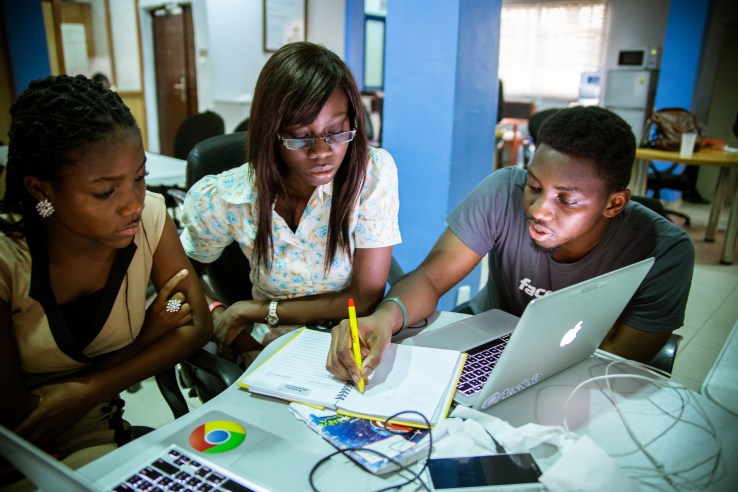Thandisizwe Mgudlwa
African education and training has always been making progress.
And its doing it again.
This time, it is through the IBM launched of its $70 million (approximately R945
million) digital education initiative, “IBM Digital - Nation Africa”, on February 8, this month.
Experts have noted that the initiative is aimed at building much-needed digital, cloud, and cognitive IT skills to
help support a 21st century workforce in Africa.
According to IBM, this initiative
provides a cloud-based learning platform designed to provide free skills
development programs for up to 25 million African youths over five
years, enabling digital competence and nurturing innovation in Africa.
"The
IBM Digital - Nation Africa initiative is part of the company’s global
push to build the next generation of skills needed for “New Collar”
careers. “New Collar” is a term used by IBM to describe new kinds of
careers that do not always require a four-year college degree but rather
sought-after skills in cybersecurity, data science, artificial
intelligence, cloud, and much more.
For the youth of Africa to be
able to benefit from a cognitive future, there needs to be a much
higher level of digital literacy. At the top of the skills pyramid are
developers, who need to know how to create solutions that can leverage
the power of cognitive, and entrepreneurs who are aware of the
potential. IBM Digital - Nation Africa is designed to help raise overall
digital literacy, increase the number of skilled developers able to tap
into cognitive engines and enable entrepreneurs and would-be
entrepreneurs grow businesses around the new solutions," IBM.
Additionally, through a free, cloud-based online learning environment delivered on IBM Bluemix,
the premier cloud platform for business, the initiative will provide a
range of programs from basic IT literacy to highly sought-after advanced
IT skills including social engagement, digital privacy, and cyber
protection.

"Advanced users will be able to explore
career-oriented IT topics including programming, cybersecurity, data
science and agile methodologies, as well as important business skills
like critical thinking, innovation, and entrepreneurship. The initiative
aims to empower African citizens, entrepreneurs, and communities with
the knowledge and tools to design, develop, and launch their own digital
solutions.
Based on
Watson, the cognitive online system will adapt and learn. It will review
the multiple interactions the education initiative will have with
students, to help direct them to the right courses and help IBM refine
the courses to better adapt the material for the needs of the users.
Watson will also create a depth of knowledge using anonymous information
gathered from interactions with the students. This will help
entrepreneurs and developers understand which current Bluemix solutions
best meet their needs and refine their idea to help them design a
solution that has greatest market potential.
With the aim of
equipping as many as 25 million people with sought after IT skills over
the next five years, the program will be launched from IBM’s regional
offices in South Africa, Kenya, Nigeria, Morocco, and Egypt. This will
enable the expansion of the initiative across the continent.
The initiative will provide
access to thousands of resources, in English, free of charge, including:
ready-to-use mobile apps; guides - web guides, demonstrations,
interactive simulations, video series, and articles; online assessments –
a range of self-assessment tests to track the
progress of individuals, together with industry recognized ‘Open Badges’
aligned to digital competencies. The badges can then be shared with
prospective employers Volunteers – Creation of a volunteer program to
support and promote digital literacy within their communities; and pp
Marketplace – Provision of a platform on which new applications can
either be made freely available or sold."
Moreover, the
initiative will be supported by the United Nations Development Program
(UNDP), which has a special focus on fostering market-driven ICT skills
in Africa and the Middle East.
IBM is to work with UNDP on
opportunities for STEM (Science, Technology, Engineering, and
Mathematics) skills delivery, certification, and accreditation.
UNDP
will also collaborate with their network of existing government partnerships to broaden the program across Africa.
IBM further notes, "In
2015, IBM rolled out a major initiative to expand its Africa Technical
Academy and Africa University Program, providing advanced skills in
cloud, analytics, and big data technologies, reaching today to over 150
academic institutions, in the continent.
And in September 2016, a memorandum
of understanding was signed between the Ministry of National Education
and Vocational Training and IBM Morocco, for the launch of P-TECH
program (Pathways in Technology Early College High School) in Morocco."
P-tech, an innovative global education model, has been designed by IBM, in
close partnership with American educators. The company is also known to be working
with dozens of start-ups in South Africa.
Hamilton Ratshefola, country
general manager for IBM South Africa. commented, “IBM
sees effective, high quality IT education as a key driver of economic
vitality in Africa. Through access to open standards, best practices,
IBM tools, and course materials, the broad scope of this initiative will
enable vital skills development”, says Ratshefola, “In order to find
solutions to Africa’s challenges, industries across the spectrum need to
enable the existing and future workforce to perform at the forefront of
technologies such as cognitive and cloud computing. This will be the
key to spurring economic growth.”




